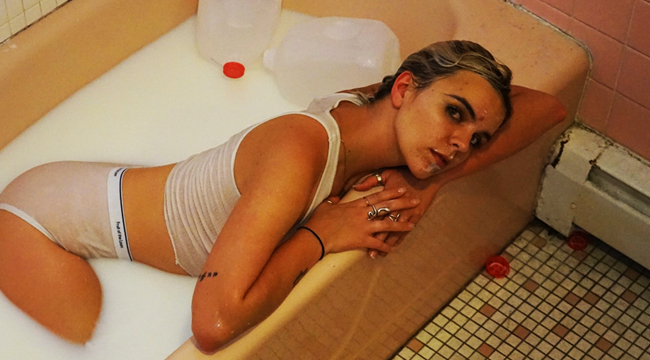
In the fall of 2000, a single by a fictitious boy band cracked the bottom of the Billboard Hot 100. “The Hardest Part Of Breaking Up (Is Getting Back Your Stuff)” marked 2gether’s only foray onto the chart, though for a few weeks in September, the novelty act, which had been cooked up by MTV for a TV movie by the same name, outsold NSYNC’s reigning hit “It’s Gonna Be Me.” “The Hardest Part” was a pitch-perfect parody of the Max Martin school of production that dominated the airwaves at the time. Among schoolkids who didn’t worry about the difference between a “real” boy band and a fake one, 2gether had a hit.
“I just want my f*cking hat back,” sings Meredith Johnston on the Warm Human song “Hat.” She’s never heard of 2gether when I mention them during a recent phone interview, but like the satirists behind 2gether, she finds humor in the trivial indignities that follow a relationship’s dissolution. It’s one of life’s most boring conundrums: Splitting up with a toxic partner and then realizing, begrudgingly, that you left your sh*t at their apartment.
“To me, ‘Hat’ is the funniest song on the album,” she says. “Humor is such a human thing. It allows things to be more accessible without you just wanting to drown yourself in tears. Especially going through a breakup and recovering, there’s gonna be times when things are ridiculous and you have to laugh.”
Johnston, 27, recorded and produced the bulk of the first Warm Human album, Ghastly, at her home in Chicago’s Logan Square neighborhood. With an 808 and a DX7, she stitched together a sound world that eschews many of the hallmarks of so-called bedroom pop. There’s no tape hiss on Ghastly, no twee vocal melodies or barely tuned guitars. Instead, Johnston sings against a slick electronic backdrop. She Auto-Tunes her own voice and chops it up in places. She throws a snare beat into sheets of reverb and offsets a glockenspiel loop with a deep sawtooth bassline. These are bold, capital-P pop gestures kidnapped from their native environment and thrown against the wall in new and surprising formations.
The album’s highlight, “Worst Kind Of Girl,” morphs back and forth from a plaintive acoustic guitar progression to an agitated dance beat, as if the song contained two sets of DNA that were both vying for space. The dissonance reflects Johnston’s lyrics, which cast her as a new escapee from a bad relationship hell-bent on embodying everything her former partner wanted to cut out of her. “I wrote “Worst Kind Of Girl” in a fever dream,” she tells me. “I think that song took me four hours. It just was spilling out of me. I was trying to cue things sonically without having to state them. There’s a lot of scene painting with different sounds — a lot of playing with deterioration and restructuring because that’s what I was mentally going through.”
Johnston wrote Ghastly after a long period of creative drought. She had ended a stifling relationship that had tamped down on her artistic habits. “At the end of the relationship, I wasn’t making anything, which is how I had formed my identity, was by making things,” she says. “I was not making anything. I had no friends. I would come home from work and make us dinner and then wake up and go to work and make us dinner. I had whittled myself into the shape that I thought this person wanted me to be, and it turned out that wasn’t right. It was never going to be right. It wasn’t me.” After leaving her partner, she set about the slow process of finding her own shape. “It took me a year and a half to start making art again after that relationship ended.”
If Warm Human’s songs navigate interpersonal conflict with cinematic aplomb, it may have something to do with Johnston’s background as an actor and screenwriter. She was a self-admitted “musical theater nerd” as a kid, and studied acting at DePaul University’s theater school. The indie drama she wrote and starred in, Pet Names, premiered at last year’s SXSW. The way she learned to use her voice as an actor helped her access the thorny places she goes on her first album. Whether you’re singing into a pop filter or speaking beneath a boom mic, much of the same logic applies: The voice has to expand and recede at the right beats. It can’t do everything at once, or it won’t sound right. But there’s something about music that lets the singer get away with telling messier secrets than the speaker: a sense of plausible deniability, an escape hatch.
“A lot of these songs are things I was too scared to speak about at the time,” Johnston tells me. “So I sang them. I created a safe enough space for me to access those emotions without having to directly deal with them. I think a lot of my songwriting process is that: What am I feeling today and how can I help myself process it?”
In 2017 and 2018, Johnston worked through the stories she’d been bottling up. She sang them, she mangled them through drum machines, she let them hover over jarring, asymmetrical synth lines. An album started to emerge from the fragments, and then she had Ghastly. “It’s really sad and really self-deprecating. A lot of it is, ‘Here’s all my really sh*tty mistakes and where I mess up all the time and my depression and all of this stuff,'” she says. “But it was at least taking ownership of that. Being like, you know what? This is who I am. I struggle so much and I fail so much, but at least these failures are mine and I’m making something out of them. And here I am making stuff. What a feat! Coming from making absolutely nothing, making a single beat, you’re like, yes!”
Ghastly is out on March 8. Get it here.






